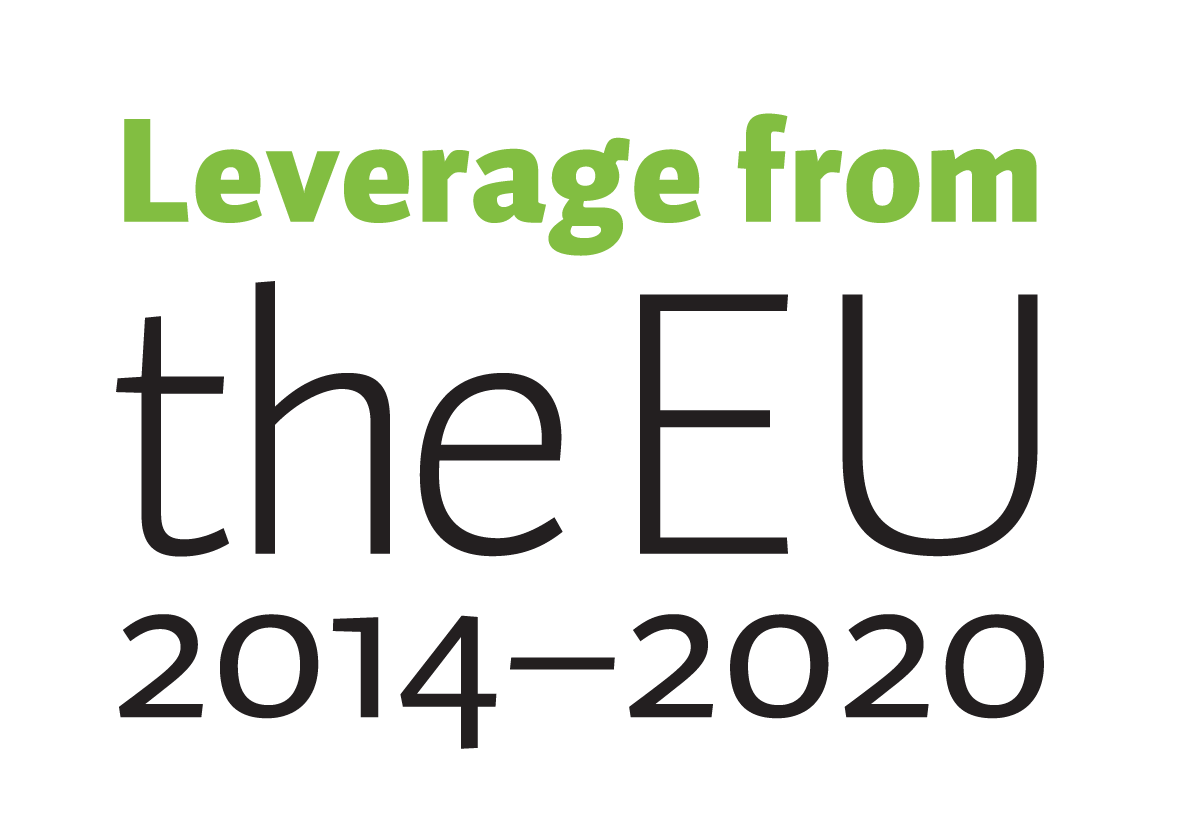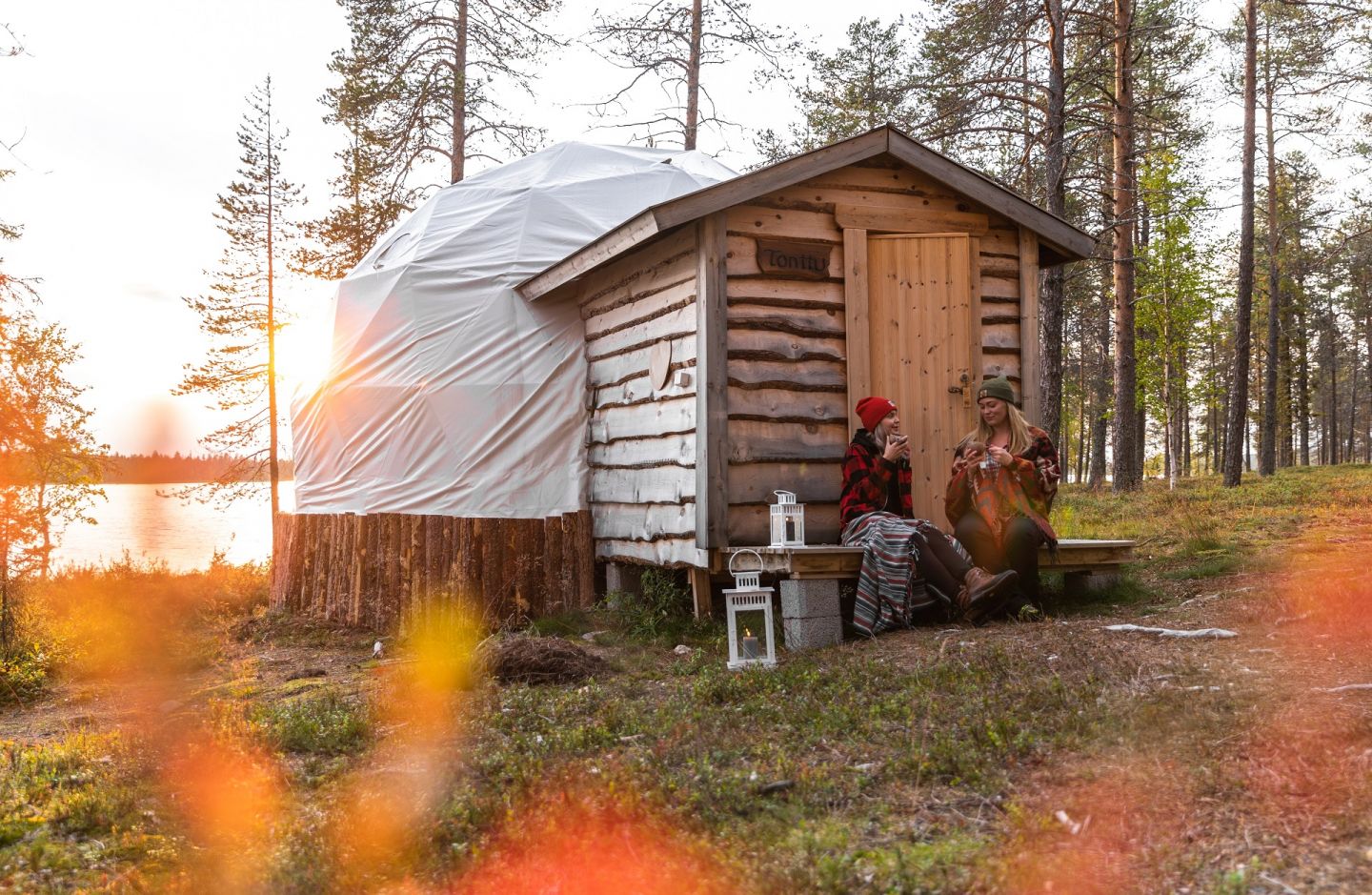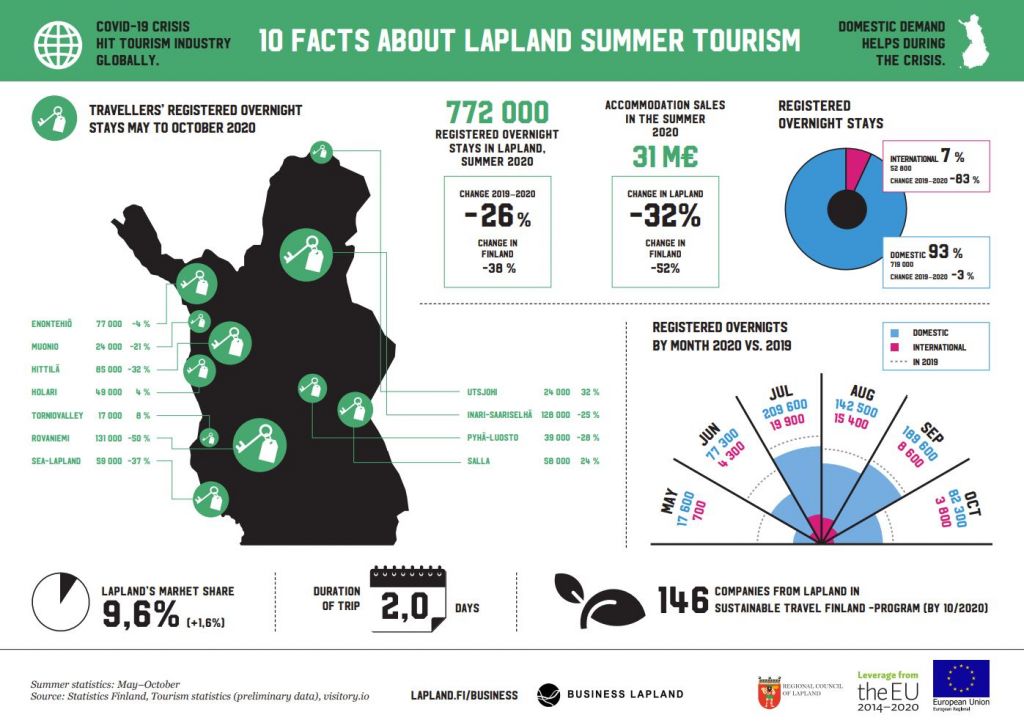The summer season of Lappish tourism had better results compared to the average of the rest of the country, and this pointed out significant regional differences within the province. A fair amount of bookings have been made for the Finnish winter holiday weeks but other weeks look quiet. The worsened coronavirus situation in Finland, in particular, causes uncertainty around the realisation of Christmas and New Year holidays.
During the summer season, from May to October, the number of registered overnight stays in Lapland was a quarter less than last year; approximately 772,000 overnight stays. On the other hand, as a result of the coronavirus crisis, the sales of accommodation decreased by almost a third. Lappish tourism clearly suffered less from the coronavirus crisis during the summer season than the Finnish average, since the number of registered overnight stays in Finland dropped by approximately 38 per cent.
Significant regional differences apparent in the results of the summer season
Within the province, the regional differences in the results of the summer season were significant. The summer season losses were most apparent in Rovaniemi, Sea Lapland, Kittilä and Inari, where the percentage of international customers has typically been greater. The number of domestic tourist overnight stays decreased during the Lappish summer season by three per cent.
The demand for domestic tourism showed preference towards smaller destinations. For example, there was an increase of approximately 24 per cent in registered overnight stays in Salla during the summer season. Heli Karjalainen from Matkalle Sallaan ry describes how the season had been a record-breaking summer for many companies in Salla.
– Summer tourism had already been increasing well, but the domestic tourists “provided” by the coronavirus situation took Salla’s summer season to an entirely new level. The summer was excellent for Salla.
Finns book their holidays, and they can also cancel them, rather close to the travel dates, which makes it difficult to assess the situation. Registered overnight stays do not include Airbnb destinations or the bookings of private cottages.
According to the statistics of Lapin Luotsi’s foresight site concerning tourism’s recovery from coronavirus, Airbnb sales increased during the summer season, particularly in Fell Lapland. During the summer season, the sales in the entire province increased by 14 million euros compared to the previous year. Kristian Sievers, Project Manager at Lapin liitto, notes that the figures are not entirely comparable because an additional 20-30 per cent of accommodation capacity has moved from other sales platforms to Airbnb.
– To some extent, the number of customers has increased, and in other respects, the customers have chosen a new booking channel. It may be a result of hotels being closed in many locations, and perhaps customers have been more inclined to stay at cottages or holiday apartments instead of choosing hotel accommodation.
Domestic demand for the winter season offers a glimpse of light
Ari Vuorentausta, Managing Director at Lapland Hotels, explains that the lost international tourists and the worsened coronavirus situation in Finland cause concern regarding the winter season although the result of the previous summer season was a positive surprise considering the circumstances. Domestic demand focuses on a certain period, around Christmas and New Year and then later on in the spring, whilst during a normal season, there have usually been plenty of visitors throughout the winter.
– Domestic sales have been reasonably good, but we will, however, probably be far behind the overall operating results of a typical winter.
Vuorentausta is satisfied and happy about the activeness of domestic tourists. Still, he also describes the atmosphere of tourism operators regarding the winter season to be miserable and bleak, because the upcoming winter will be difficult for everyone.
Lappish tourism operators worked hard for the government’s travel restrictions to be changed and for international tourists to be able to arrive during the winter season. Yet, the restrictions remained unchanged, despite the criticism. International tourism faced the most recent drawback when the travel agency TUI informed, at the beginning of November, that it would cancel all its Christmas holidays to Lapland. The company justified the cancellation of the trips in November and December with the uncertain coronavirus situation and the travel restrictions in place in Finland.
In September, the domestic agency, Aurinkomatkat, began to sell package holidays to different destinations in Lapland, and this was welcomed with delight. Thus, the company decided to increase its capacity, and later in November, it added new destinations. Holidays are currently being sold to Levi, Saariselkä, Rovaniemi, Ylläs, Luosto, Pyhä, Pallas and Ruka in Kuusamo.
In the company’s press release, Timo Kousa, Managing Director at Aurinkomatkat, explains that the plan is to sell domestic holiday packages all year round.
– The demand for domestic holiday packages exceeded all our expectations, and during the first few weeks, we have sold well over one thousand package holidays. We quickly sold out the holidays for the most popular holiday weeks, but we have flexibly been able to increase the capacity, says Kousa in the press release.
The Airbnb situation of the winter season is assessed according to booking statistics: the summer boom has begun to decline when reviewing the winter bookings.
– According to preliminary information, the situation at Lappish destinations could be moderate during the Finnish holiday weeks, i.e. weeks 52 and 53, and the winter holiday weeks. There seems to be domestic demand unless travel restrictions are issued within Finland. The problem is that the demand, after New Year until the winter holiday weeks, is relatively low everywhere, says Kristian Sievers.
The number of Airbnb bookings in Lapland for November was half the amount compared to the same period last year. For example, 1,049 destinations have been booked in Rovaniemi for the Christmas week, while 3,379 bookings were made last year.
– There are many question marks concerning where the disease situation is heading and whether the booked holidays be realised, explains Sievers.
Domestic customers have already made a good number of bookings to Salla for the winter season, even more than during previous winters. However, a dark cloud lingers over companies offering programme services because the Finnish population consumes fewer services compared to international tourists.
– But in light of the situation, entrepreneurs have a good attitude and are working to achieve what they can this winter. As before in Salla, cooperation is vital, and the municipality aims to help as much as possible. The excellent news regarding the progress of Salla’s national park application offers a glimpse of light, says Heli Karjalainen.




